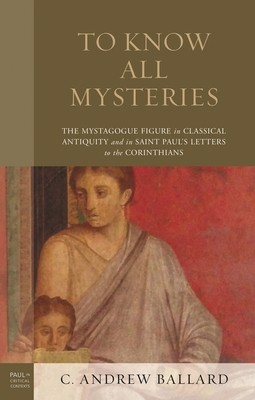
- We will send in 10–14 business days.
- Author: C Andrew Ballard
- Publisher: FORTRESS ACADEMIC
- ISBN-10: 1978711107
- ISBN-13: 9781978711105
- Format: 15.2 x 22.9 x 2.7 cm, hardcover
- Language: English
- SAVE -10% with code: EXTRA
Reviews
Description
This book examines the way that Paul presents himself as a guide into mysteries, a "mystagogue," in 1-2 Corinthians. By describing himself as a type of mystagogue for the community, Paul was following a precedent in both Jewish and non-Jewish sources for invoking mystagogic language to engage in polemics with a rival. In opposition to the precedent, however, Paul understands the mystagogue to be a bi-partite figure-comprised of both foolishness and wisdom simultaneously. C. Andrew Ballard argues that ancient mystagogues were often described in two disparate ways: figures of power, and figures of weakness and foolishness. Paul synthesizes both aspects of the mystagogue in his self-presentation to the Corinthians. The figure of the mystagogue, as a wise-fool, was useful to Paul because it was descriptive not only of his own experience as a suffering yet authoritative apostle, but also of the experience of his deity, the suffering and glorified Christ. By presenting himself as both a powerful and foolish mystagogue, Paul could argue that he was a more authentic imitator of Christ than his opponents in Corinth, who boasted in self-exaltation instead of self-humility. In this way, Paul used the character of the mystagogue as a strategic rhetorical tool in his communication with the Corinthians.
EXTRA 10 % discount with code: EXTRA
The promotion ends in 19d.18:26:14
The discount code is valid when purchasing from 10 €. Discounts do not stack.
- Author: C Andrew Ballard
- Publisher: FORTRESS ACADEMIC
- ISBN-10: 1978711107
- ISBN-13: 9781978711105
- Format: 15.2 x 22.9 x 2.7 cm, hardcover
- Language: English English
This book examines the way that Paul presents himself as a guide into mysteries, a "mystagogue," in 1-2 Corinthians. By describing himself as a type of mystagogue for the community, Paul was following a precedent in both Jewish and non-Jewish sources for invoking mystagogic language to engage in polemics with a rival. In opposition to the precedent, however, Paul understands the mystagogue to be a bi-partite figure-comprised of both foolishness and wisdom simultaneously. C. Andrew Ballard argues that ancient mystagogues were often described in two disparate ways: figures of power, and figures of weakness and foolishness. Paul synthesizes both aspects of the mystagogue in his self-presentation to the Corinthians. The figure of the mystagogue, as a wise-fool, was useful to Paul because it was descriptive not only of his own experience as a suffering yet authoritative apostle, but also of the experience of his deity, the suffering and glorified Christ. By presenting himself as both a powerful and foolish mystagogue, Paul could argue that he was a more authentic imitator of Christ than his opponents in Corinth, who boasted in self-exaltation instead of self-humility. In this way, Paul used the character of the mystagogue as a strategic rhetorical tool in his communication with the Corinthians.


Reviews